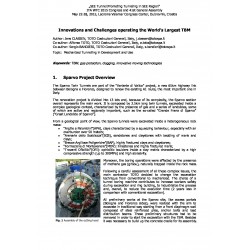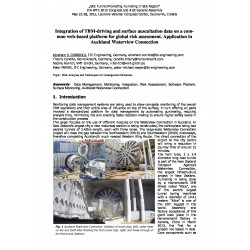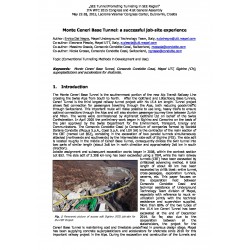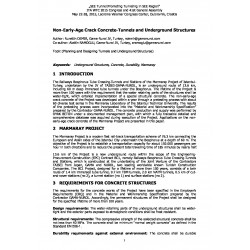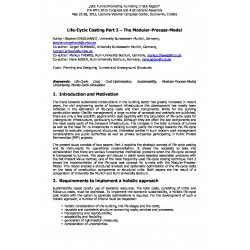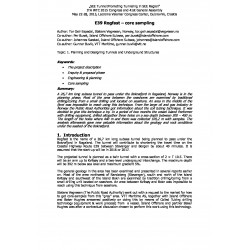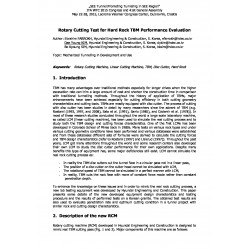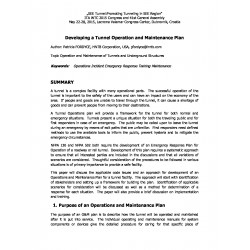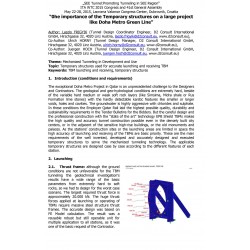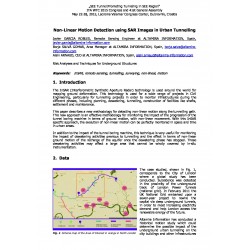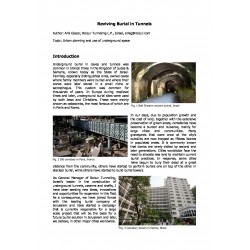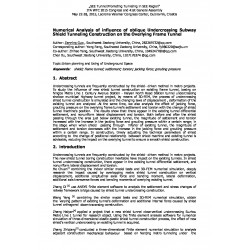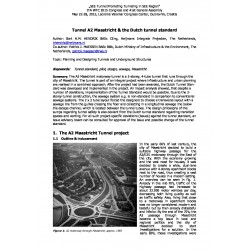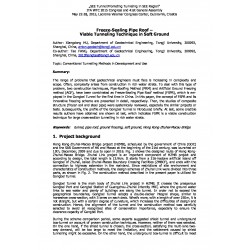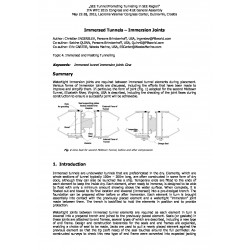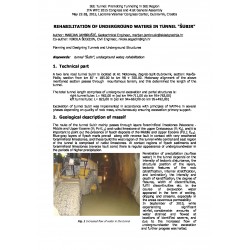No document
Search & filter
Search for a publication
Search & filter
World Tunnelling Congress
WTCThere are 1984 documents.
-
Innovations and Challenges operating the World’s Largest TBM
Abstract: The Sparvo Twin Tunnels are part of the “Variante di Valico” project, a new 65km highway link between Bologna e Florence, designed to renew the existing A1 route, the most important one in Italy. The renovation project is divided into 13 lots and, because of its complexity, the Sparvo section overall represents the main work. It is composed by 2.5km long twin tunnels, excavated inside a complex...
0,00 € -
Integration of TBM-driving and surface auscultation data on a common web-based platform for global risk assessment....
Abstract: Monitoring data management systems are being used to allow complete monitoring of the overall TBM operations and their entire area of influence on top of the surface, in turn offering all parts involved a standardized platform for data management by automating purchasing, reducing analysis time, minimizing risk and enabling faster decision-making to ensure higher safety levels in the...
0,00 € -
Monte Ceneri Base Tunnel: a successful job-site experience
Abstract: The Monte Ceneri Base Tunnel is the southernmost portion of the new Alp Transit Railway Line crossing the Swiss Alps from South to North. After the Gotthard and Lötschberg Base tunnels, Ceneri Tunnel is the third largest railway tunnel project with his 15.4 km length. Tunnel project allows fast connection for passengers travelling through the Alps, both reducing goods-traffic through...
0,00 € -
Non-Early-Age Crack Concrete-Tunnels and Underground Structures
Abstract: The Railways Bosphorus Tube Crossing-Tunnels and Stations of the Marmaray Project of Istanbul- Turkey, undertaken by the JV of TAISEI-GAMA-NUROL, is an underground route of 13.6 km, including 60 m deep immersed tube tunnels under the Bosphorus. The lifetime of the Project is more than 100 years with the requirement that the water retaining parts of the structures shall be water-tight, which...
0,00 € -
Life-Cycle Costing Part 2 – The Modular-Process-Model
Abstract: The trend towards sustainable constructions in the building sector has greatly increased in recent years. For civil engineering works of transport infrastructure this development has mostly been reflected in the estimation of life-cycle costs and their components. While for the building construction sector (facility management) a large number of concepts and methods are published, there are...
0,00 € -
E39 Rogfast – core sampling
Abstract: A 26,7 km long subsea tunnel to pass under the Boknafjord in Rogaland, Norway is in the planning phase. Most of the area between the seashores are examined by traditional drilling/coring from a small drilling unit located on seashore. An area in the middle of the fjord was impossible to reach using this technique. From the large oil and gas industry in Norway the Public Road Authorities got...
0,00 € -
Rotary Cutting Test for Hard Rock TBM Performance Evaluation
Abstract: TBM has many advantages over traditional methods especially for longer drives when the higher excavation rate can trim a large amount of cost and shorten the construction time in comparison with traditional tunnelling methods. Throughout the history of application of TBMs, major enhancements have been achieved especially for cutting efficiency in both cutting geometry characteristics and...
0,00 € -
Developing a Tunnel Operation and Maintenance Plan
Abstract: A tunnel is a complex facility with many operational parts. The successful operation of the tunnel is important to the safety of the users and can have an impact on the economy of the area. If people and goods are unable to travel through the tunnel, it can cause a shortage of goods and can prevent people from moving to their destinations. A Tunnel Operations plan will provide a framework for...
0,00 € -
The importance of the Temporary structures on a large project like Doha Metro Green Line
Abstract: The exceptional Doha Metro Project in Qatar is an unprecedented challenge to the Designers and Contractors. The geological and geo-hydrological conditions are extremely hard, beside of the variable hard medium or weak soft rock layers (like Simsima, Midra shale or Rus Formation lime stones) with the hardly detectable karstic features like smaller or larger voids, holes and cavities. The...
0,00 € -
Non-Linear Motion Detection using SAR Images in Urban Tunnelling
Abstract: The InSAR (Interferometric Synthetic Aperture Radar) technology is used around the world for mapping ground deformation. This technology is used for a wide range of projects in Civil Engineering, particularly for tunnelling projects in order to monitor infrastructures during the different phases, including planning, dewatering, tunnelling, construction of facilities like shafts, settlement and...
0,00 € -
Reviving Burial in Tunnels
Abstract: Underground burial in caves and tunnels was common in biblical times in the Kingdom of Judea & Samaria, known today as the State of Israel. Families, especially distinguished ones, owned caves where family members were buried and where their bones were later stored in a small niche or sarcophagus. This custom was common for thousands of years. In Europe during medieval times and later,...
0,00 € -
Numerical Analysis of influence of oblique Undercrossing Subway Shield Tunneling Construction on the Overlying Frame...
Abstract: Undercrossing tunnels are frequently constructed by the shield- driven method in metro projects. To study the influence of new shield tunnel construction on existing frame tunnel, basing on Ningbo Metro Line 1 Century Avenue Station - Haiyan North Road Station tunnel undercrossing shallow municipal highway tunnel project, by means of 3D-FEM, the process of undercrossing shield tunnel...
0,00 € -
Tunnel A2 Maastricht and the Dutch tunnel standard
Abstract: The A2 Maastricht motorway tunnel is a 2-storey, 4-tube tunnel that runs through the city of Maastricht. The tunnel is part of an integral project where infrastructure and urban planning are realised in a combined approach. After the project had been awarded, the Dutch Tunnel Stan- dard was developed and implemented in the project. An impact analysis showed, that despite a number of deviations,...
0,00 € -
Freeze-Sealing Pipe Roof – Viable Tunneling Technique in Soft Ground
Abstract: The range of problems that geotechnical engineers must face is increasing in complexity and scope. Often, complexity arises from construction in rich water strata. To deal with this type of problem, two construction techniques, Pipe-Roofing Method (PRM) and Artificial Ground Freezing method (AGF), have been combinated as Freeze-Sealing Pipe Roof method (FSPR), which is em- ployed in the Gongbei...
0,00 € -
Immersed Tunnels – Immersion Joints
Abstract: Watertight immersion joints are required between immersed tunnel elements during placement. Various forms of immersion joints are discussed, including the efforts that have been made to improve and simplify them. In particular, the form of joint (Fig. 1) adopted for the second Midtown Tunnel, Elizabeth River, Virginia, USA is described, including the checking of the joint faces during...
0,00 € -
Rehabilitation of underground waters in tunnel "Šubir"
Abstract: The route of the tunnel Subir mainly passes through layers foraminiferal limestones Paleocene - Middle and Upper Eocene (V; Pc-E1,2) and rudist limestone of the upper Cretaceous (V; K2), and it is important to point out the presence of flysch deposits of the Middle and Upper Eocene (F(L); E2,3). Blue-gray layers of flysch marls prevail along with reverse fault in contact with very weathered...
0,00 €

